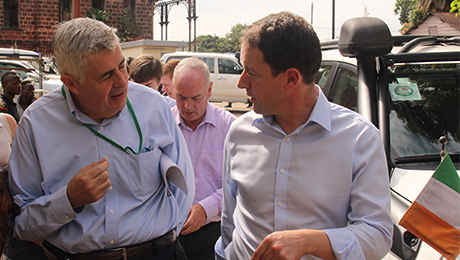Irish Aid’s response to the Ebola crisis in West Africa
2/10/14
Minister Sherlock with Concern CEO Dominic MacSorley at an Ebola Command Centre in Freetown
Ireland is playing a strong role in the international response to the Ebola crisis, through the work on the ground of our Embassy in Sierra Leone and our significant financial support.
More than 21,000 people are reported to have been infected, and over 8,000 have lost their lives. While there appears to have been a welcome slow-down in the incidence of cases of Ebola in recent weeks, there are fluctuations from country to country. It is therefore essential that the international community maintains its resolve to defeat the epidemic and not lose the momentum of our response.
Ireland has provided direct funding of almost €18 million in 2014 to organisations working on the Ebola response in Sierra Leone and Liberia, which are both partner countries for Ireland. This funding is supporting much needed NGO led awareness raising programmes in local communities in the most affected areas. The lack of such awareness in both countries has hampered response efforts and contributed to the spread of the virus.
We have provided over €5.6 million specifically for Ebola treatment facilities and for work on contact-tracing, community mobilisation and child nutrition programmes. We intend to continue this strong focus in 2015.
Ireland dispatched 42 tonnes of practical equipment, to be distributed to affected communities, including:
- blankets,
- tarpaulin,
- tents,
- mosquito nets,
- soap,
- jerry cans, and
- water tanks
Ireland is also contributing much needed human resources with public health specialists from the Department of Health having served with the World Health Organisation in Nigeria and Liberia in August. A member of the Irish Aid was deployed to Dakar, Senegal to work with the World Food Programme to set up an air transit centre for use by the UN Humanitarian Air Service.
Colleagues in our embassy in Freetown are working closely with the local authorities and international partners to identify what assistance is most needed to try to manage the current outbreak, to support the local health and government infrastructure, and to prevent further spread of the virus. Our Embassies in Freetown and Abuja are in ongoing contact with registered citizens, ensuring they are aware of the precautions necessary to ensure their health and safety and providing regular updates to our travel advice in line with international best practice.
Citizens Registration
We are asking all those in the affected area to register on our Citizens Registration page at www.dfa.ie/travel

